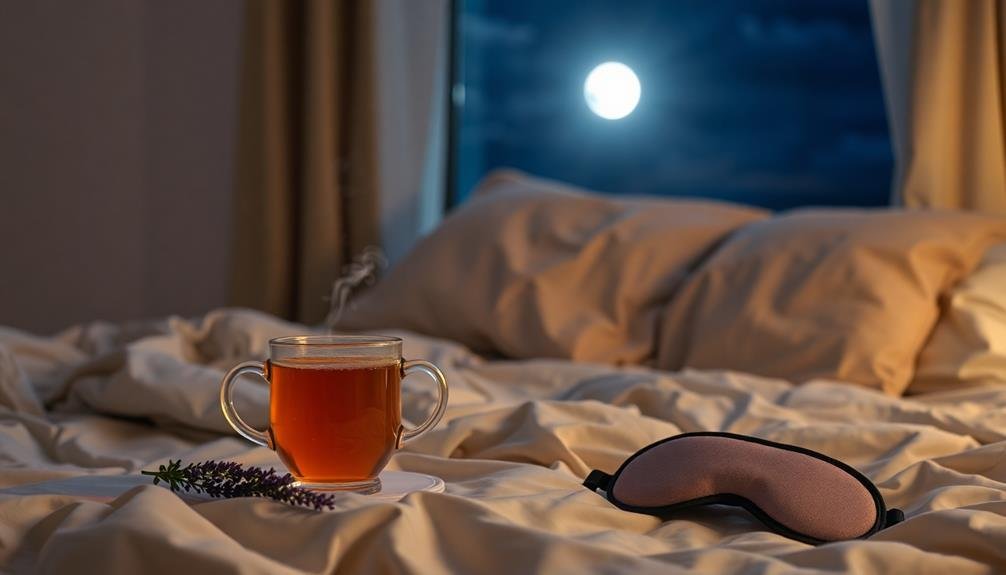Chamomile tea offers seven natural ways to ease your anxiety. It calms your nervous system, reduces stress hormones, and promotes better sleep. You'll find your mood enhanced as it boosts serotonin levels and soothes digestive issues often linked to anxiety. This soothing brew also supports your immune function, helping you stay healthy during stressful times. By creating a mindful ritual around preparing and drinking chamomile tea, you'll anchor yourself in a moment of calm. These benefits work together to provide a holistic approach to managing anxiety. Discover how this simple cup can transform your daily routine and overall well-being.
Calming Nervous System

Three key ways chamomile tea calms your nervous system: First, it contains apigenin, a flavonoid that binds to specific receptors in your brain, promoting relaxation.
Second, chamomile tea increases levels of glycine, an amino acid that acts as a mild sedative, helping to soothe your nerves and reduce muscle tension.
Third, it boosts the production of serotonin and melatonin, neurotransmitters that regulate mood and sleep, respectively.
When you drink chamomile tea, you're not just enjoying a warm, comforting beverage; you're actively supporting your nervous system.
The compounds in chamomile work synergistically to create a calming effect throughout your body. They help slow down racing thoughts, ease physical symptoms of anxiety like rapid heartbeat and sweating, and promote an overall sense of tranquility.
Regular consumption of chamomile tea can lead to cumulative benefits, potentially reducing the frequency and intensity of anxiety episodes over time.
It's a natural, non-addictive way to support your mental health and manage stress.
Reducing Stress Hormones
While chamomile tea is known for its calming effects, it also plays a crucial role in reducing stress hormones in your body. When you're anxious, your body produces excess cortisol, the primary stress hormone. Chamomile tea can help lower cortisol levels, promoting a sense of relaxation and well-being.
The flavonoids in chamomile, particularly apigenin, interact with your brain's receptors, potentially decreasing the production of stress hormones. This interaction may also increase the availability of serotonin and dopamine, neurotransmitters that contribute to mood regulation and stress reduction.
Regular consumption of chamomile tea can help stabilize your body's stress response over time. You'll likely notice a decrease in physical symptoms associated with high stress hormone levels, such as rapid heartbeat, sweating, and muscle tension.
To maximize these benefits, try drinking chamomile tea consistently, especially during periods of heightened stress. You can brew it hot or cold, and even combine it with other stress-reducing herbs like lavender or lemon balm.
Promoting Better Sleep

Chamomile tea can help you achieve better sleep by calming racing thoughts that often accompany anxiety.
It may regulate your sleep-wake cycle, making it easier to fall asleep and wake up at consistent times.
Additionally, this soothing beverage can reduce nighttime stress, allowing you to relax more fully before bedtime.
Calms Racing Thoughts
For many people struggling with anxiety, racing thoughts can make falling asleep a nightly challenge. Chamomile tea can help calm these persistent mental loops, allowing you to relax and drift off more easily. The active compounds in chamomile, particularly apigenin, interact with your brain's GABA receptors, promoting a sense of tranquility and easing mental tension.
When you're lying in bed, unable to quiet your mind, try sipping a warm cup of chamomile tea. Its soothing properties can help:
- Reduce the intensity of anxious thoughts
- Slow down your mental chatter
- Create a sense of mental spaciousness
As you drink the tea, focus on its gentle aroma and warmth. This mindful act can serve as a grounding technique, pulling your attention away from worrisome thoughts. You'll likely notice your mind becoming less cluttered and more serene within 15-30 minutes of drinking the tea.
Regular consumption of chamomile tea can also have a cumulative effect on managing racing thoughts. By incorporating it into your nightly routine, you're creating a calming ritual that signals to your brain it's time to wind down and prepare for sleep.
Regulates Sleep-Wake Cycle
Getting your sleep-wake cycle back on track is another way chamomile tea can help manage anxiety. When you're anxious, your sleep patterns often suffer, creating a vicious cycle that exacerbates your anxiety symptoms.
Chamomile tea contains apigenin, a flavonoid compound that binds to specific receptors in your brain, promoting sleepiness and reducing insomnia. By drinking chamomile tea before bedtime, you're signaling to your body that it's time to wind down. This ritual can become a powerful cue for your brain to start preparing for sleep.
The tea's mild sedative effects can help you fall asleep faster and improve your overall sleep quality. Moreover, chamomile tea can help regulate your circadian rhythm, the internal process that governs your sleep-wake cycle.
Reduces Nighttime Stress
Beyond regulating your sleep-wake cycle, chamomile tea's calming properties play a key role in reducing nighttime stress. As you wind down for the evening, sipping on a warm cup of chamomile can help ease tension and promote relaxation. The tea's natural compounds, particularly apigenin, interact with your brain receptors to induce a sense of calmness and tranquility.
Chamomile tea's stress-reducing effects can be particularly beneficial for those who struggle with racing thoughts or anxiety before bed. By incorporating this soothing beverage into your nightly routine, you'll:
- Lower cortisol levels, the stress hormone that can interfere with sleep
- Ease muscle tension, allowing your body to relax more easily
- Quiet your mind, making it easier to let go of worries and concerns
As you make chamomile tea a regular part of your evening ritual, you'll likely notice improvements in your ability to fall asleep and stay asleep throughout the night.
This reduction in nighttime stress can lead to more restful sleep, leaving you feeling refreshed and rejuvenated in the morning. By addressing anxiety at its root, chamomile tea helps create an environment conducive to quality sleep and overall well-being.
Enhancing Mood
Chamomile tea can enhance your mood by boosting serotonin levels in your brain.
You'll experience a natural uplift in your spirits as this neurotransmitter, often called the "feel-good" chemical, increases.
Additionally, chamomile's ability to calm your nervous system contributes to an overall sense of well-being and contentment.
Boosting Serotonin Levels
Serotonin boost is another potential benefit of chamomile tea for those dealing with anxiety. This neurotransmitter plays an important role in regulating mood, and low levels are often associated with anxiety and depression. While research is ongoing, some studies suggest that chamomile may help increase serotonin levels in the brain, potentially leading to improved mood and reduced anxiety symptoms.
When you drink chamomile tea, you're introducing compounds that can interact with your body's serotonin system. The tea contains flavonoids and other bioactive compounds that may influence serotonin production and activity.
Here's how chamomile tea might boost your serotonin levels:
- Increasing tryptophan availability: Chamomile may help increase the availability of tryptophan, an amino acid precursor to serotonin.
- Enhancing serotonin receptor sensitivity: The tea's compounds might improve the sensitivity of serotonin receptors in your brain.
- Inhibiting serotonin reuptake: Chamomile could potentially slow down the reabsorption of serotonin, allowing it to remain active in your system longer.
Calming Nervous System
Another essential aspect of chamomile tea's anxiety-reducing properties is its ability to calm the nervous system. When you drink chamomile tea, it acts as a mild sedative, helping to soothe your nerves and reduce tension. The tea contains apigenin, a flavonoid that binds to specific receptors in your brain, promoting relaxation and reducing anxiety symptoms.
Chamomile tea's calming effects extend beyond just your mind. It can also help relax your muscles, ease digestive discomfort, and promote overall physical tranquility. This holistic approach to calming your nervous system can greatly impact your anxiety levels.
To visualize the calming effects of chamomile tea on your nervous system, consider the following:
| Body System | Chamomile's Effect | Benefit |
|---|---|---|
| Brain | Binds to GABA receptors | Reduces mental stress |
| Muscles | Promotes relaxation | Eases physical tension |
| Digestive | Soothes stomach | Alleviates anxiety-related discomfort |
Soothing Digestive Issues

Beyond its calming effects on the mind, chamomile tea can work wonders for your digestive system. When you're anxious, your gut often bears the brunt of your stress, leading to various digestive issues. Chamomile's anti-inflammatory properties help soothe your stomach lining and reduce discomfort associated with anxiety-induced digestive problems.
Drinking chamomile tea regularly can provide relief from:
- Bloating and gas
- Stomach cramps and spasms
- Nausea and indigestion
These benefits stem from chamomile's ability to relax the muscles in your digestive tract, promoting smoother digestion and reducing tension. By easing these physical symptoms, you'll likely experience a reduction in overall anxiety levels as well.
Chamomile tea also supports the growth of beneficial gut bacteria, which play an essential role in maintaining your mental health. The gut-brain connection is well-established, and a healthy digestive system can positively influence your mood and stress levels.
To maximize chamomile's digestive benefits, try drinking a cup after meals or before bed. You'll not only soothe your stomach but also create a calming ritual that can help alleviate anxiety throughout your day.
Boosting Immune Function
Chamomile tea's benefits extend far beyond digestion, reaching into the domain of immune health. This soothing brew contains compounds that can bolster your body's natural defenses. Apigenin, a flavonoid found in chamomile, has been shown to have anti-inflammatory and antioxidant properties that may help protect your cells from damage.
When you're feeling under the weather, a cup of chamomile tea can be your ally. It's rich in vitamin C, which supports immune function and helps your body fight off infections. The tea's antispasmodic effects may also help relieve congestion and soothe sore throats, making it a comforting choice when you're battling a cold or flu.
| Immune-Boosting Properties | Benefits | How It Helps |
|---|---|---|
| Apigenin | Anti-inflammatory | Reduces inflammation |
| Vitamin C | Antioxidant | Protects cells |
| Antispasmodic effects | Symptom relief | Eases congestion |
Regular consumption of chamomile tea may contribute to long-term immune health. By incorporating it into your daily routine, you're not only enjoying a delicious beverage but also supporting your body's natural defense mechanisms. Remember, while chamomile tea can be a helpful addition to your wellness regimen, it's not a substitute for medical treatment when you're ill.
Mindful Ritual for Relaxation

Countless individuals have discovered the power of turning their chamomile tea routine into a mindful relaxation ritual. By incorporating intentional practices into your tea preparation and consumption, you can enhance the anxiety-reducing effects of chamomile. This ritual can serve as a daily anchor, helping you shift from stress to calm.
To create your own mindful chamomile tea ritual:
- Choose a quiet space: Select a peaceful area in your home where you won't be disturbed. This could be a cozy corner, a comfortable chair, or even a spot by a window with a pleasant view.
- Engage your senses: Pay attention to the aroma of the tea as it steeps, the warmth of the cup in your hands, and the gentle steam rising from the surface. These sensory experiences can help ground you in the present moment.
- Practice deep breathing: While sipping your tea, take slow, deep breaths. Inhale for a count of four, hold for four, then exhale for four. This simple breathing technique can activate your body's relaxation response.
Frequently Asked Questions
Can Chamomile Tea Interact With Medications for Anxiety or Depression?
Yes, chamomile tea can interact with certain anxiety and depression medications. You should consult your doctor before consuming it regularly, especially if you're taking SSRIs, benzodiazepines, or blood thinners. It's always best to be cautious with herbal remedies.
How Much Chamomile Tea Should I Drink Daily for Optimal Anxiety Relief?
You'll want to drink 1-4 cups of chamomile tea daily for anxiety relief. Start with one cup and gradually increase if needed. It's best to consult your doctor, especially if you're on medications or have health concerns.
Is Chamomile Tea Safe for Pregnant or Breastfeeding Women With Anxiety?
If you're pregnant or breastfeeding, it's best to consult your healthcare provider before drinking chamomile tea for anxiety. While generally considered safe, there's limited research on its effects during pregnancy and lactation. Your doctor can provide personalized advice.
Are There Any Side Effects or Risks Associated With Drinking Chamomile Tea?
You'll generally find chamomile tea safe, but it can cause allergic reactions in some people. It might interact with blood thinners and increase drowsiness when combined with sedatives. Consult your doctor if you have any concerns.
Can Chamomile Tea Be Used as a Natural Alternative to Anti-Anxiety Medications?
While chamomile tea can help reduce anxiety, it's not a substitute for prescribed medications. You shouldn't replace your anti-anxiety meds without consulting your doctor. It can, however, be a complementary natural remedy to support your overall well-being.
In Summary
You've discovered the powerful anxiety-relieving benefits of chamomile tea. By incorporating this soothing brew into your daily routine, you're taking a natural approach to calming your nerves, improving sleep, and boosting your overall well-being. Remember, it's not just about the tea itself, but also the mindful ritual of preparing and enjoying it. So, next time you're feeling stressed, reach for a cup of chamomile and let its gentle effects wash over you.





Leave a Reply